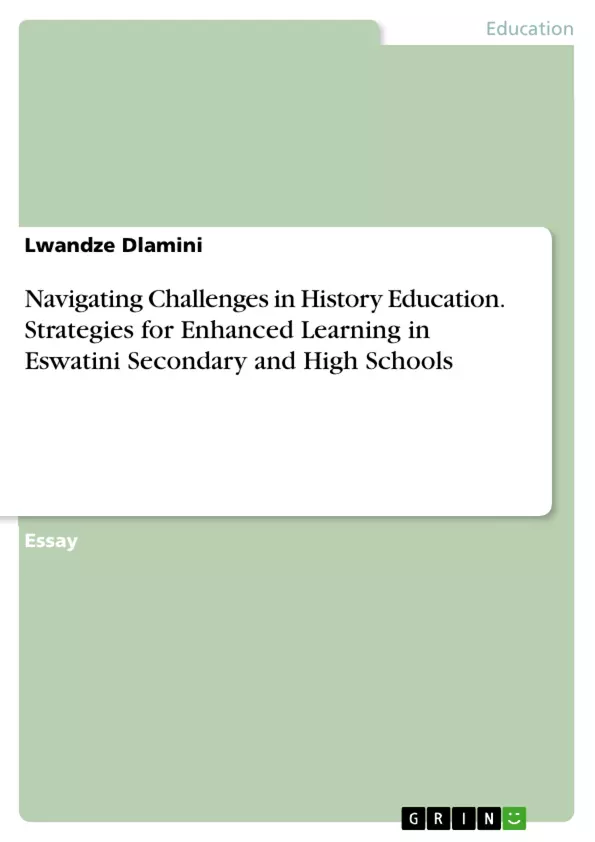This essay examines challenges faced by history teachers in secondary and high schools in Eswatini, ranging from student attitudes to resource inadequacies. Focusing on issues such as the scarcity of teaching aids, lack of administrative support, and insufficient materials, the essay proposes practical solutions. These include equal departmental funding, advocating for equal time allocation, emphasizing the subject's importance to students, and improving teaching methods. The essay also addresses the shortage of qualified teachers and the impact of large class sizes. Conclusively, it advocates for a holistic approach, urging long-term investment in history education to align resources with other subjects.
Inhaltsverzeichnis (Table of Contents)
- Challenges Facing the Teaching of History in Eswatini
- Insufficiency of Teaching Materials
- Lack of Administrative Help
- Lack of Stationary and Books
- Students' Negative Attitudes Towards History
- Traditional Methods of Teaching History
- Lack of Qualified History Teachers
- Huge Class Numbers
Zielsetzung und Themenschwerpunkte (Objectives and Key Themes)
This essay explores the challenges faced by history teachers in secondary and high schools in Eswatini, focusing on how these issues hinder effective teaching and learning. It aims to provide insights into the specific challenges and offer practical solutions to improve the state of history education in the country.
- Insufficiency of Teaching and Learning Resources (TLR)
- Lack of Administrative Support and Insufficient Teaching Time
- Students' Negative Attitudes Towards History
- Limitations of Traditional Teaching Methods
- Shortage of Qualified History Teachers
Zusammenfassung der Kapitel (Chapter Summaries)
- The essay begins by addressing the challenge of insufficient teaching and learning resources (TLR) in history classrooms. The lack of audio-visual aids, maps, and field trip opportunities significantly impacts learner engagement and interest in the subject. The author suggests increasing funding for the history department to acquire these resources.
- The second challenge discussed is the lack of administrative support and insufficient teaching time for history. The author highlights the inadequate assistance provided by school administration and the limited timetable slots allocated to history, often resulting in afternoon classes. The author suggests engaging the principal to ensure equal time allocation for history and prioritize morning classes.
- The lack of stationary and books, especially in under-resourced schools, presents another challenge. The author emphasizes the importance of providing students with adequate reference materials, suggesting photocopies as a potential solution.
- Students' general lack of interest in history, driven by various factors including its perceived irrelevance to the modern world, is explored. The author suggests addressing this by highlighting the analytical skills developed through studying history and emphasizing its importance in critical thinking.
- The limitations of traditional teaching methods, particularly the lecture method, are analyzed. The author encourages history teachers to adopt more interactive methods, incorporating student-led discussions and self-directed learning strategies.
- The essay also examines the challenge of a shortage of qualified history teachers. The author emphasizes the need for qualified instructors from higher learning institutions to ensure effective teaching and learning.
- Lastly, the essay addresses the challenge of large class sizes, which impact teacher workload and student engagement. The author recommends strategies for managing large groups and reducing student-to-teacher ratios.
Schlüsselwörter (Keywords)
The key focus of this essay is the challenges faced by history education in Eswatini, with a particular emphasis on insufficient resources, administrative support, student engagement, and the effectiveness of teaching methods. The essay highlights the need for improved resource allocation, curriculum development, and teacher training to enhance the quality of history education in Eswatini.
- Quote paper
- Lwandze Dlamini (Author), 2021, Navigating Challenges in History Education. Strategies for Enhanced Learning in Eswatini Secondary and High Schools, Munich, GRIN Verlag, https://www.grin.com/document/1436371



